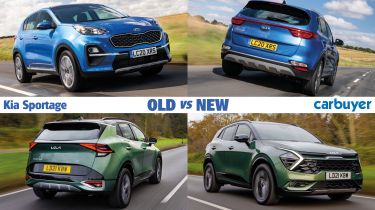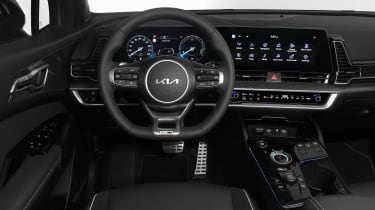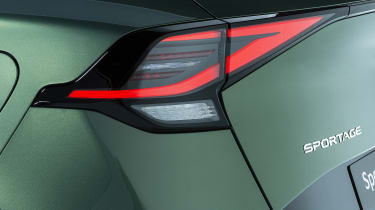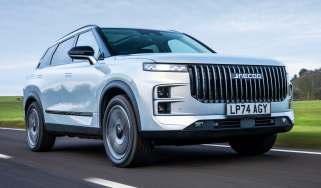Kia Sportage: old vs new
The latest Kia Sportage features bold styling and more hybrid engine options. We see how it compares to a used model
The Kia Sportage typifies the rise of the Korean brand, and has helped pave the way for its current range of excellent models. It started as a bland, cheap 4x4, but in its later generations, the Sportage has become a real leader in the family SUV class, blending style, practicality and a well-built interior with Kia’s class-leading warranty.
Enough people bought into the Sportage way of life that the old version regularly sat in our list of the UK’s best-selling cars. It’d be reasonable to expect that Kia would play safe with the new version, given its popularity, but with confidence high from cars like the Kia EV6 and Kia Sorento, the new Sportage has been treated to a thorough styling overhaul.
Not everyone will like the styling; the last car divided opinion too. But the new car should appeal to a wider cross-section of buyers, as multiple electrified engines are available to help reduce emissions and running costs. Tech lovers are catered for, too, with Kia’s very latest infotainment features being included across the range.
But you shouldn’t discount the last Kia Sportage, sold from 2016 to 2021, because even a year-old model is noticeably cheaper than a new one on the used market. We’ve compared old and new to see which you should choose.
Which has the best interior?
As was the fashion when the last Sportage was introduced, its touchscreen is neatly integrated between the air vents in the centre of the dashboard. It looks smart but there’s little of the design flair you get in the Peugeot 3008, and the layout of the dash means there’s no option for a larger infotainment display. More importantly, Kia got all the material decisions right; the seats are incredibly comfortable, and every panel feels solid and high-quality.
Now, the latest Sportage follows technology trends with a bank of screens mounted on the dashboard. You’ll notice that the touchscreen is much larger than before (on all but the entry-level trim), while the climate control panel is now touch-sensitive and designed to make the car feel wider and more spacious. The gear lever has been replaced with a rotary dial, and is surrounded by buttons that make the lower console feel like a control centre. Its technology, borrowed from the cutting-edge electric EV6, is as good as the materials used.
Both Sportages get the same trim levels, making it easy to compare them. The entry-level ‘2’ is joined by ‘3’ and ‘4’ models, along with a pair of sporty GT-Line trims. Plump for the old model and you still get a strong array of equipment in ‘2’ trim, including Apple CarPlay, Android Auto, sat nav, two-zone climate control and heated seats. The new version doesn’t offer heated seats until the ‘3’ trim, but it does feature brighter LED headlights as standard.
Which is more economical?
One of the main drawbacks we found with the old Sportage was that it’s not the most economical family SUV. It performs decently enough for a car of this type; the diesel nudges 50mpg and the petrol manages up to 37mpg, but those figures are around 10mpg behind its most efficient rivals. Most buyers were happy enough to overlook this as the Sportage impressed in most areas, finishing in the top-10 of our 2021 Driver Power owner satisfaction survey.
The new Sportage features a much wider range of engines. The 1.6-litre petrol engine is available with four different levels of electrical assistance, from none all the way up to a plug-in hybrid that’s capable of 35 miles of electric-only driving. Mild-hybrid petrol versions are likely to be popular, and manage 44mpg, while the hybrid petrol returns almost 50mpg. Note that the bigger the battery, the more expensive the car gets, and top versions encroach on Audi Q5 and BMW X3 territory.
Which is best to drive?
Neither of these generations of Sportage will excite driving enthusiasts, but both are competent and feel secure on the road. We found the ride to be slightly firmer on the new model, although we’ve only tested range-topping versions with big wheels so far. Body roll is kept to a minimum, so your passengers won’t feel like they are sloshed around in corners. The hybrid version of the new Sportage is loud when accelerating, but very refined once up to speed.
Which is most practical?
Each generation of the Sportage has gained more interior space, so both these cars are spacious five-seaters. In terms of boot space, the last-generation Sportage offers 491 litres in petrol cars, or 439 litres in mild-hybrid diesel cars. That’s reasonable for the class, while its usability is bolstered by a very low load lip to haul items over. Many cars also got a useful space-saver spare wheel as well.
The new model is even more suited to families, with between 526 and 587 litres of boot space depending on the engine you pick. Not only is that very impressive when compared to its closest rivals, but it’s what you’d expect from a load-lugging estate car. Interestingly, the Sportage we get in Europe is smaller than the one sold in North America, but still offers one of the biggest boot spaces of any medium-size SUV. Kia has once again reduced the size of the load lip, while adding extra features like USB charging ports located in the front seatbacks.
Which should you buy?
You might be able to tell that we’re going to recommend choosing the new Kia Sportage over its predecessor. Even discounting its distinctive looks, the new model offers more space, lower running costs and more tech, so it’s worth choosing if your budget allows. If it doesn’t, then you’re still getting an excellent family SUV if you choose the last-generation version.
Check out used Kia Sportage deals on our sister site BuyaCar.
Recommended

New Subaru Trailseeker revealed as rugged electric SUV with 375bhp

New Subaru Solterra brings more range, power and polish
Most Popular
Tips & advice

Car dashboard warning lights: what does each symbol mean?

Electric car charging stations: public networks, charger types, apps and maps












